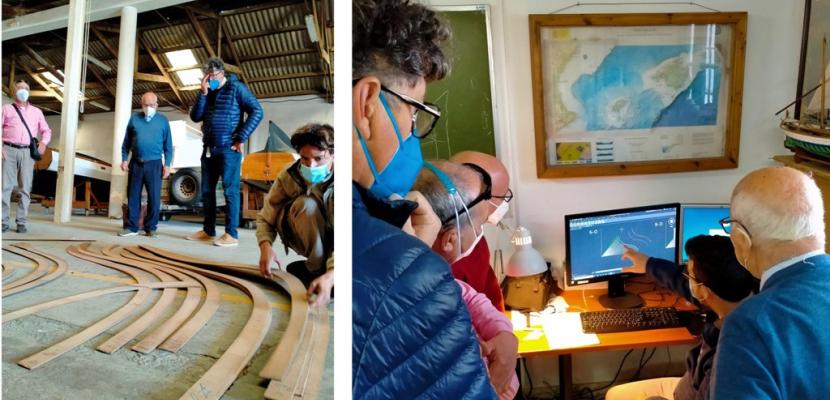Image

GÀLIBS Project
Published on 20 May 2021

Spain
Illes Balears
This is the good practice's implementation level. It can be national, regional or local.
About this good practice
Traditional shipbuilder trade in Mallorca is in jeopardy since the demand for new wooden boats is practically non-existent and shipbuilders work consists only in repairing the remaining ones (about 700 on the island). The wooden boat is the keystone of this traditional trade. Thus, “Gàlibs” project aims to preserve part of this know-how through the compilation of templates (called “gàlibs” in local language) from wooden boats designed by shipbuilders and try to obtain as much information as possible about abandoned and structurally unsound boats.
The traditional shipbuilders team from Consell de Mallorca has contacted shipbuilders in Mallorca to document the trade. Currently, there are 16 still working, 4 inactive and 13 already retired. They ask them for permission to borrow and copy their own designed templates or those inherited from fathers, grandfathers or former masters. The team draws blueprints and waterline plans out of these templates, and then they return them to the owners.
The team also tours the island looking for traditional wooden boats structurally unsound to obtain templates in situ and preserve their shape. Afterwards, they investigate the documentation of boats from the name and plate number. Without this task, these boats will disappear unrecorded.
To complete the work, the team develops a database which includes registration forms for every boat and templates and uploads images, measures, blueprints, waterline plans, information on the shipbuilder.
The traditional shipbuilders team from Consell de Mallorca has contacted shipbuilders in Mallorca to document the trade. Currently, there are 16 still working, 4 inactive and 13 already retired. They ask them for permission to borrow and copy their own designed templates or those inherited from fathers, grandfathers or former masters. The team draws blueprints and waterline plans out of these templates, and then they return them to the owners.
The team also tours the island looking for traditional wooden boats structurally unsound to obtain templates in situ and preserve their shape. Afterwards, they investigate the documentation of boats from the name and plate number. Without this task, these boats will disappear unrecorded.
To complete the work, the team develops a database which includes registration forms for every boat and templates and uploads images, measures, blueprints, waterline plans, information on the shipbuilder.
Expert opinion
The good practice at hand shows that the know-how required for designing traditional wooden boats can be successfully spared from disappearing thanks to local authorities committed to preserve the cultural heritage. Cities and regions in coastal areas may certainly learn from it also with the view to transmit to new generations the information and the tools that are necessary to build boats that could serve the purpose of developing sustainable tourism and fisheries in line with the new approach for a sustainable blue economy in the EU adopted by the European Commission on 17 May 2021.
Resources needed
Historian and two traditional shipbuilders: €62,604.38/year.
Occasional external collaboration (shipbuilder, photographer, expert in ship plans): €5,500 for the first year.
Materials: €4,000 (trailer, laser gauge, design software, drawing table, photographic equipment).
Occasional external collaboration (shipbuilder, photographer, expert in ship plans): €5,500 for the first year.
Materials: €4,000 (trailer, laser gauge, design software, drawing table, photographic equipment).
Evidence of success
A dozen of abandoned and disappeared traditional wood boats have been documented.
Templates compiled from six shipbuilders.
The staff is motivated by their role as saviours of the expertise of ancient shipbuilders and of abandoned boats. Also, they improve their skills in measurements, design and digitalization of ship plans.
Shipbuilders see their trade valorized. It is a recognition for their craftwork and enhances the appreciation of the wooden boat as a heritage asset.
Templates compiled from six shipbuilders.
The staff is motivated by their role as saviours of the expertise of ancient shipbuilders and of abandoned boats. Also, they improve their skills in measurements, design and digitalization of ship plans.
Shipbuilders see their trade valorized. It is a recognition for their craftwork and enhances the appreciation of the wooden boat as a heritage asset.
Potential for learning or transfer
All artisanal fleets in European regions have shipbuilders and wooden boats in jeopardy so this project is perfectly transferable everywhere with few differences in terms of methodology comparing with Mallorca (interview to shipbuilders, collection of templates, transfer and recording of material, searching of abandoned boats...).
There is an emergent interest in the project among public institutions and associations for the safeguard of traditional boats in Menorca. The Consell Insular of Menorca organized in 2020 a technical day addressing heritage experts, which included “Gàlibs” methodology in the agenda.
The main beneficiary of this project is the traditional shipbuilder since his intangible work (the design) will be protected and transferred in the future. On the other side, the collection and recording of this information permits “to fight” against the progressive loss of the artisanal fleet since it guarantees the transfer of knowledge and design to future generations.
There is an emergent interest in the project among public institutions and associations for the safeguard of traditional boats in Menorca. The Consell Insular of Menorca organized in 2020 a technical day addressing heritage experts, which included “Gàlibs” methodology in the agenda.
The main beneficiary of this project is the traditional shipbuilder since his intangible work (the design) will be protected and transferred in the future. On the other side, the collection and recording of this information permits “to fight” against the progressive loss of the artisanal fleet since it guarantees the transfer of knowledge and design to future generations.
Good practice owner
You can contact the good practice owner below for more detailed information.
Organisation
Consell de Mallorca - Environment Department

Spain
Illes Balears
Contact
European projects technician